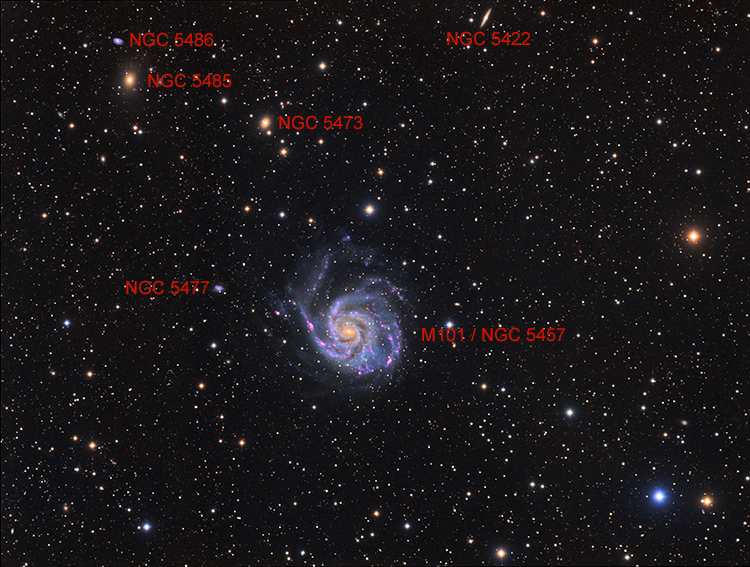|
|
Click the image for a full
size uncropped view.
(3352 x 2532 1.90 MB)

|
Instrument |
Takahashi FSQ-106ED @
f/5.0 (530 mm F.L.) Captured at 2.1 arcsec/pixel. Shown at
2.1, 4.28 and 9.38 arcsec/pixel. |
|
Mount |
Losmandy G11 with Gemini L4 v1.0 |
|
Camera |
SBIG STF-8300M Self
Guiding Package w/ mono ST-i, using Baader LRGB filters. |
|
Acquisition Data |
5/4/2014 to
6/23/2014 Chino Valley, AZ... with CCDSoft & CCD Commander. |
|
Exposure |
|
Lum |
570 min. (38 x
15 min.) bin 1x1 |
|
Ha |
525 min. (35 x
15 min.) " |
|
Red |
150 min. (10 x
15 min.) |
|
Green
|
180 min. (12 x 15 min.)
" |
|
Blue
|
210 min. (14 x 15 min.)
" |
|
|
Software & Processing Notes |
-
CCDSoft, CCDStack, PixInsight
and Photoshop CS6.
-
eXcalibrator
v4.25 for (g:r) color balancing, using 140 stars from the
SDSS-DR9 database.
-
CCDStack to
calibrate, register, normalize, data reject, combine the sub
exposures and to create the RGB
image.
-
PixInsight for
gradient removal and initial non-linear stretching.
-
PhotoShop for the
LRGB combine, adding Ha data to the red channel and final touch-up.
-
Noiseware 5, a
PhotoShop plug-in.
|
|
Comment |
North is to the top.
In the full-size
image, galaxies as faint as magnitude 21.7 are easily seen. A count,
with the Aladin Sky Atlas, shows at least 7,000 visible background
galaxies.
The following is from
Wikipedia.
M101 was discovered by Pierre Méchain on March 27, 1781, and he
subsequently communicated his discovery to Charles Messier who
verified its position and added it to the Messier Catalogue. AT a
distance of about 27 million light-years, M101 is a relatively large
galaxy compared to the Milky Way. With a diameter of 170,000
light-years it is nearly twice as large.
A remarkable property of this galaxy are its huge and extremely
bright HII regions, of which a total of about 3000. HII regions are
places in galaxies that contain enormous clouds of high density
hydrogen gas contracting under its own gravitational force.
Eventually, when the localized hydrogen contracts enough for fusion
processes to begin, stars are born.
|
|